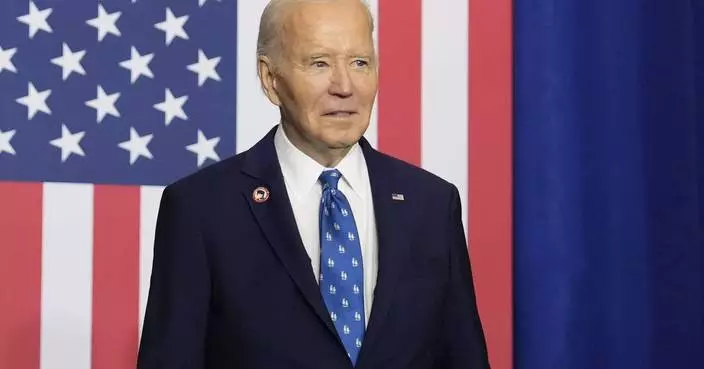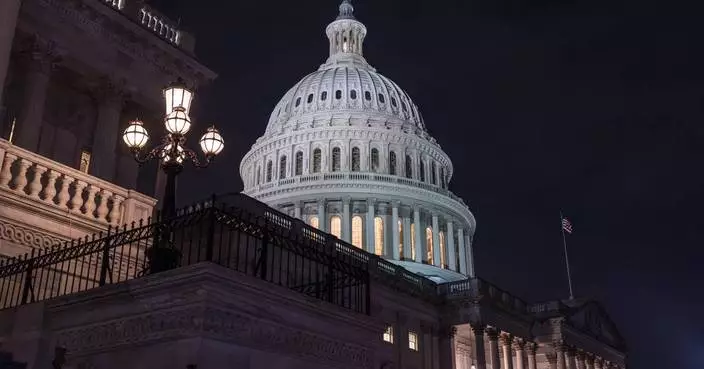NEW YORK (AP) — U.S. stocks rebounded Tuesday after falling oil prices released some of the pressure that built up on the market.
The S&P 500 rallied 1% to claw back all of its loss from the day before. The Dow Jones Industrial Average rose 126 points, or 0.3%, and likewise neared its record set last week, while the Nasdaq composite led the way with a 1.4% rally.
Click to Gallery
The New York Stock Exchange, rear, is shown on Tuesday, Oct. 8, 2024, in New York. (AP Photo/Peter Morgan, File)
FILE - Signs mark the intersection of Broadway and Wall Street in the Financial District on Oct. 2, 2024, in New York. Trinity Church is in the background. (AP Photo/Peter Morgan, File)
FILE - The New York Stock Exchange is shown on Sept. 24, 2024., 2024, in New York. (AP Photo/Peter Morgan, File)
Currency traders pass by a screen showing the Korea Composite Stock Price Index (KOSPI), center left, and the foreign exchange rate between U.S. dollar and South Korean won, center, at the foreign exchange dealing room of the KEB Hana Bank headquarters in Seoul, South Korea, Tuesday, Oct. 8, 2024. (AP Photo/Ahn Young-joon)
Currency traders watch monitors at the foreign exchange dealing room of the KEB Hana Bank headquarters in Seoul, South Korea, Tuesday, Oct. 8, 2024. (AP Photo/Ahn Young-joon)
A currency trader passes by a screen showing the Korea Composite Stock Price Index (KOSPI), left, and the foreign exchange rate between U.S. dollar and South Korean won at the foreign exchange dealing room of the KEB Hana Bank headquarters in Seoul, South Korea, Tuesday, Oct. 8, 2024. (AP Photo/Ahn Young-joon)
Wall Street held firm even though stock markets around the world sank following scary swings in China, as euphoria about possible stimulus for the world’s second-largest economy gave way to disappointment. Stocks tumbled 9.4% in Hong Kong for their worst day since the 2008 global financial crisis.
Helping to support Wall Street was a sharp drawdown in oil prices. They gave back some of the big recent gains they made on worries that worsening tensions in the Middle East could ultimately lead to disruptions in the flow of oil.
A barrel of Brent crude, the international standard, fell 4.6% to $77.18 for its first loss in a week and a half. A barrel of benchmark U.S. crude, meanwhile, eased 4.6% to $73.57.
That also helped level off the pressure on the stock market from the bond market. Treasury yields eased a bit, a day after they shot to their highest levels since the summer.
The 10-year Treasury yield edged down to 4.02 from 4.03% late Monday. The two-year yield, which more closely tracks expectations for what the Federal Reserve will do with overnight interest rates, slipped to 3.96% from 3.99%, late Monday, though it’s still near its highest level since August.
When Treasurys are paying higher yields, investors generally become less willing to pay very high prices for stocks and other investments. And Treasury yields had been storming higher over the last week following a suite of reports showing the U.S. economy remains healthier than expected.
Such reports, including one last week showing stronger hiring by U.S. employers than forecast, raise hopes that the economy will avoid a recession. But they also force traders to ratchet back expectations for how much the Federal Reserve will cut interest rates by, now that it has widened its focus to include keeping the economy humming instead of just fighting high inflation.
Traders have abandoned expectations for the Fed to cut its main interest rate by a larger-than-usual half of a percentage point at its next meeting, for example. Instead, they’re largely betting on a traditional-sized cut of a quarter of a percentage point, according to data from CME Group. Some are even calling for the possibility the Fed could keep its main rate steady in November.
High Treasury yields put the most pressure on stocks seen as the most expensive, and that puts the spotlight on the Big Tech stocks that have led the market for most of the last few years.
On Tuesday, all of the Big Tech stocks that have collectively come to be called the “Magnificent Seven” rose. Nvidia led the way with a gain of 4% and was the strongest single force pushing upward on the S&P 500.
PepsiCo climbed 1.9% after delivering stronger profit for the latest quarter than analysts expected, though its revenue fell short.
CEO Ramon Laguarta also said the company now expects a “low single-digit” increase in an important measure of revenue for the year after it had earlier forecast growth of about 4%. U.S. consumers continue to pull back on buying snacks and drinks after years of price increases.
On the losing end of Wall Street were oil-and-gas companies, which gave back some of their big recent gains driven by the last week's jump in crude prices. Chevron fell 1.6% and was one of the main reasons the Dow lagged other indexes.
All told, the S&P 500 rose 55.19 points to 5,751.13. The Dow added 126.13 to 42,080.37, and the Nasdaq gained 259.01 to 18,182.92.
In stock markets abroad, trading in mainland China reopened following a national holiday. Before, indexes in Shanghai and Shenzhen had surged on hopes for stimulus from the government and the central bank meant to prop up the economy’s flagging growth.
On Tuesday, China’s economic planning agency outlined details of measures aimed at boosting the economy, but it refrained from major spending initiatives. That helped lead to the 9.4% drop for the Hang Seng index in Hong Kong.
In Shanghai, where the market had been closed as Hong Kong ran higher over the last week, stocks rose 4.6% following their reopening.
The disappointment in China had worldwide effects, knocking down stocks of companies in Europe, the United States and elsewhere that do lots of business in and around China. Estee Lauder fell 2.2%, for example, while Wynn Resorts lost 3.3%.
AP Business Writers Matt Ott, Elaine Kurtenbach and Zen Soo contributed.
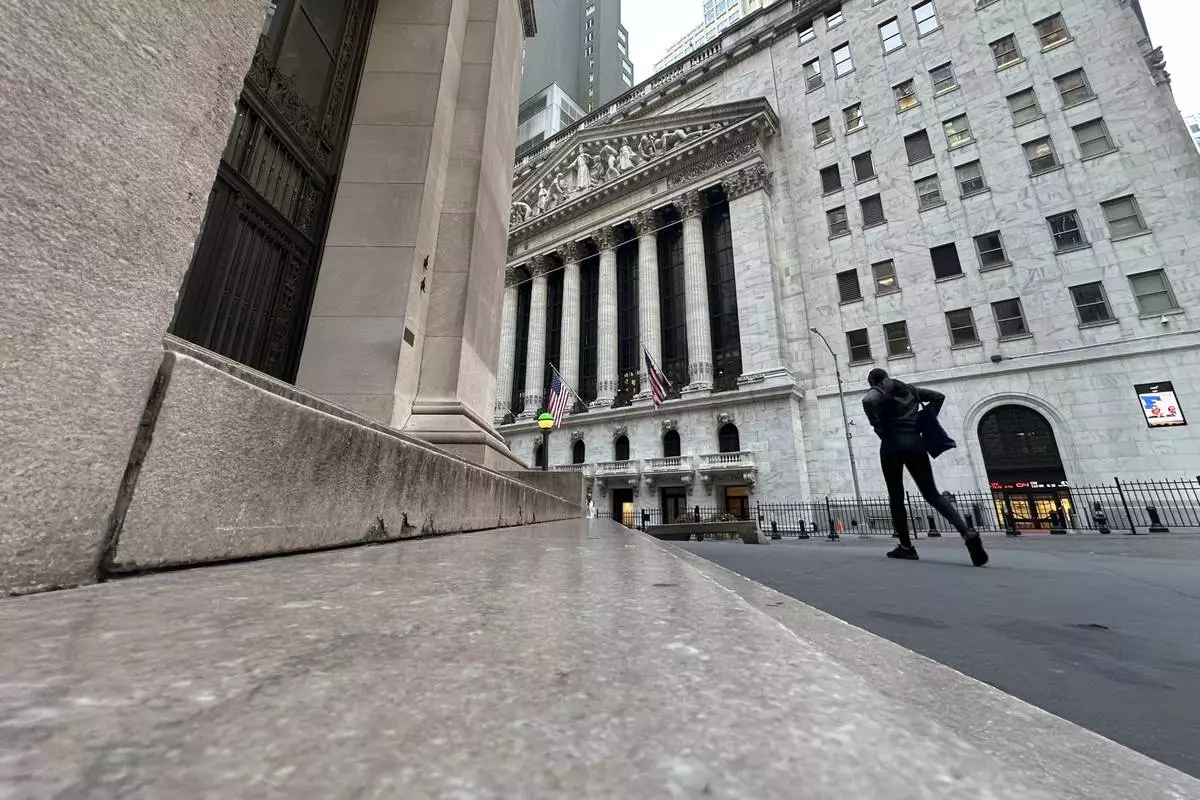
The New York Stock Exchange, rear, is shown on Tuesday, Oct. 8, 2024, in New York. (AP Photo/Peter Morgan, File)
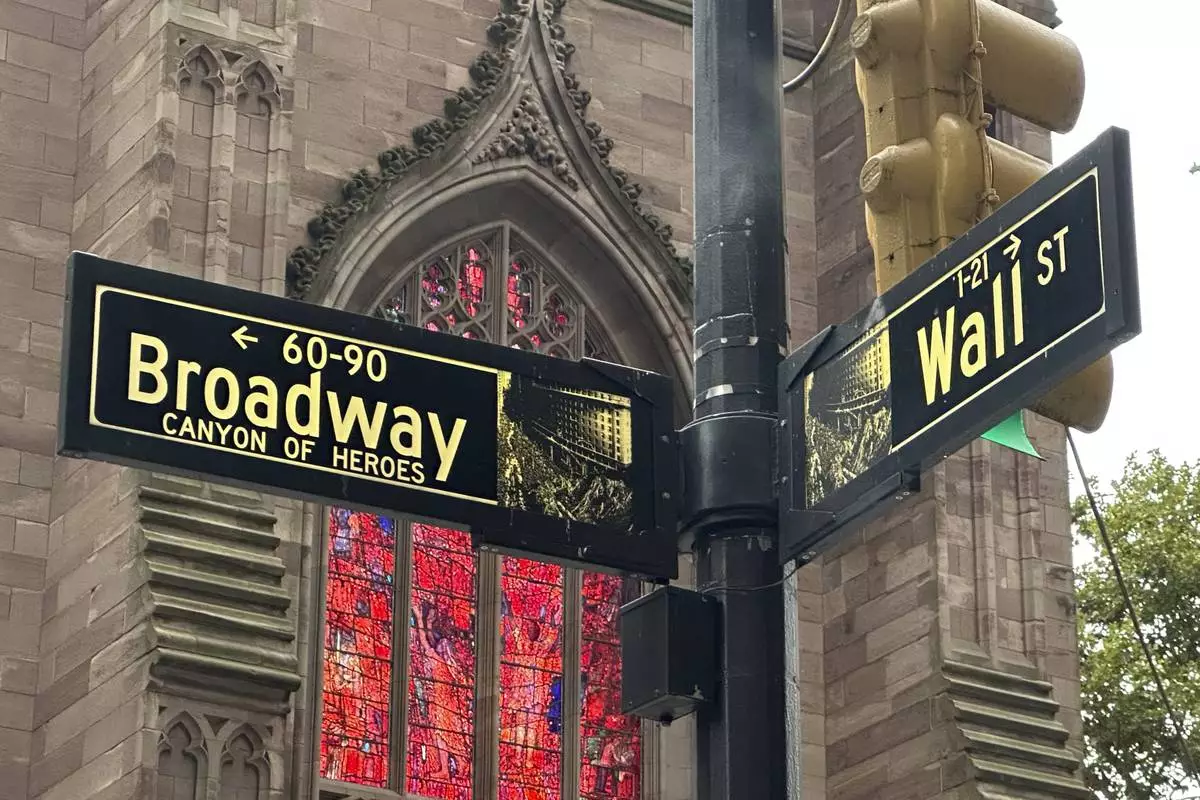
FILE - Signs mark the intersection of Broadway and Wall Street in the Financial District on Oct. 2, 2024, in New York. Trinity Church is in the background. (AP Photo/Peter Morgan, File)
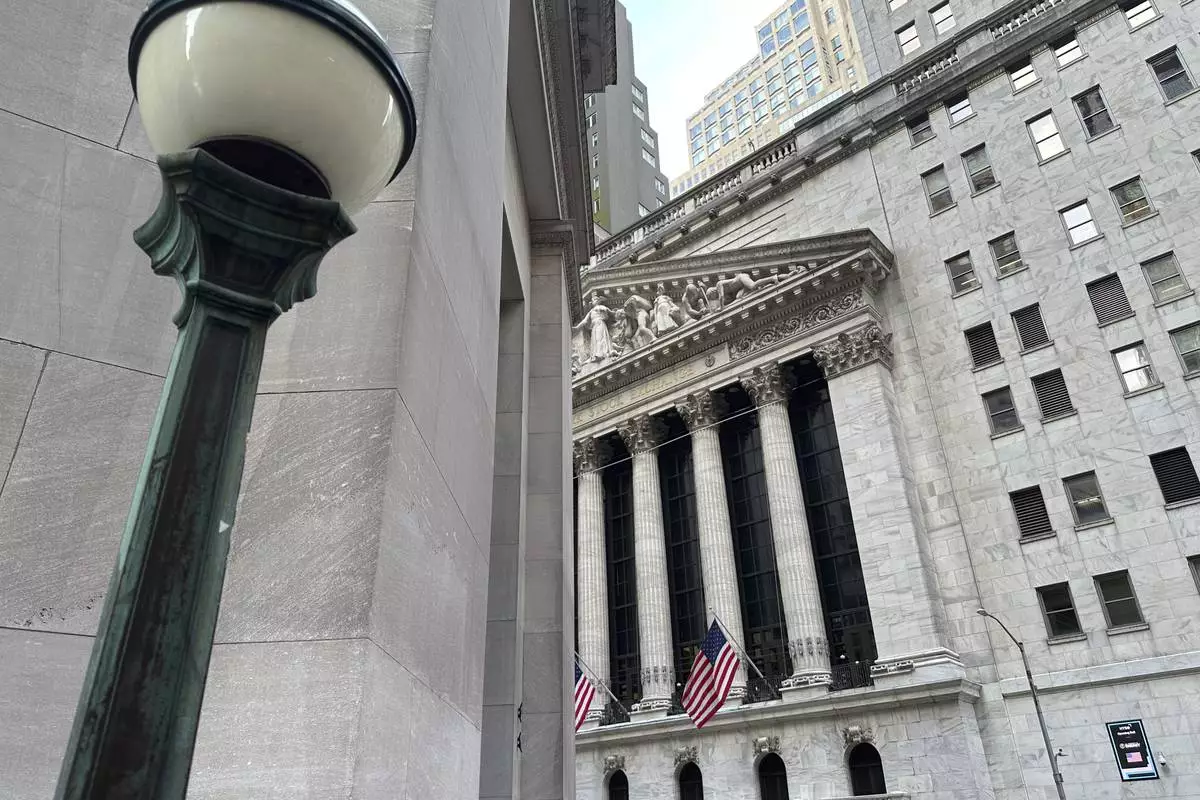
FILE - The New York Stock Exchange is shown on Sept. 24, 2024., 2024, in New York. (AP Photo/Peter Morgan, File)
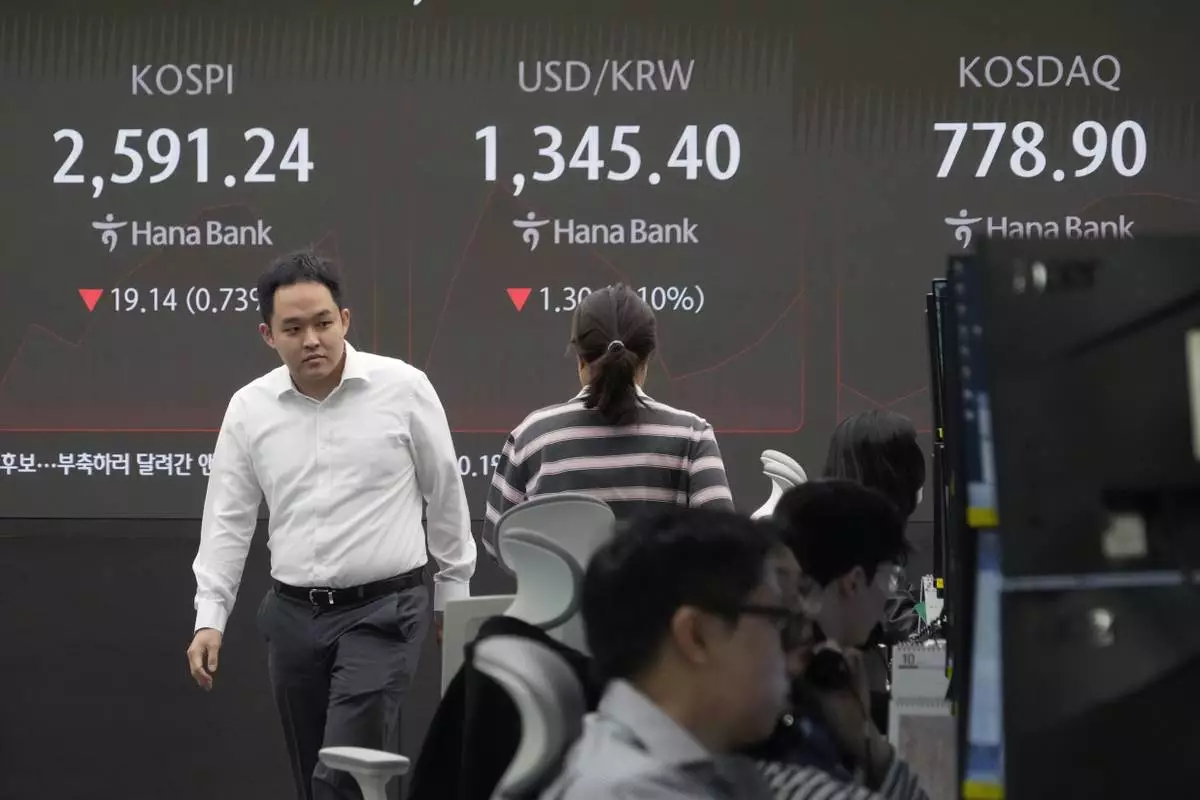
Currency traders pass by a screen showing the Korea Composite Stock Price Index (KOSPI), center left, and the foreign exchange rate between U.S. dollar and South Korean won, center, at the foreign exchange dealing room of the KEB Hana Bank headquarters in Seoul, South Korea, Tuesday, Oct. 8, 2024. (AP Photo/Ahn Young-joon)
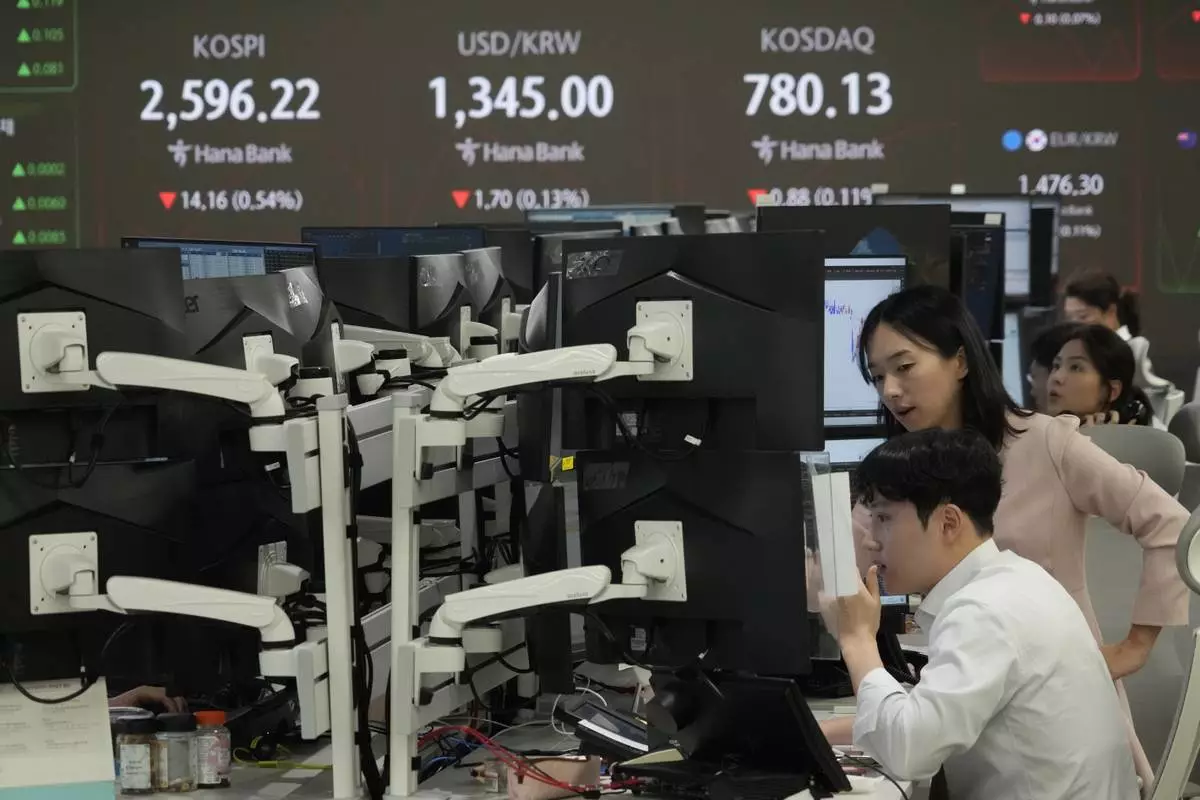
Currency traders watch monitors at the foreign exchange dealing room of the KEB Hana Bank headquarters in Seoul, South Korea, Tuesday, Oct. 8, 2024. (AP Photo/Ahn Young-joon)
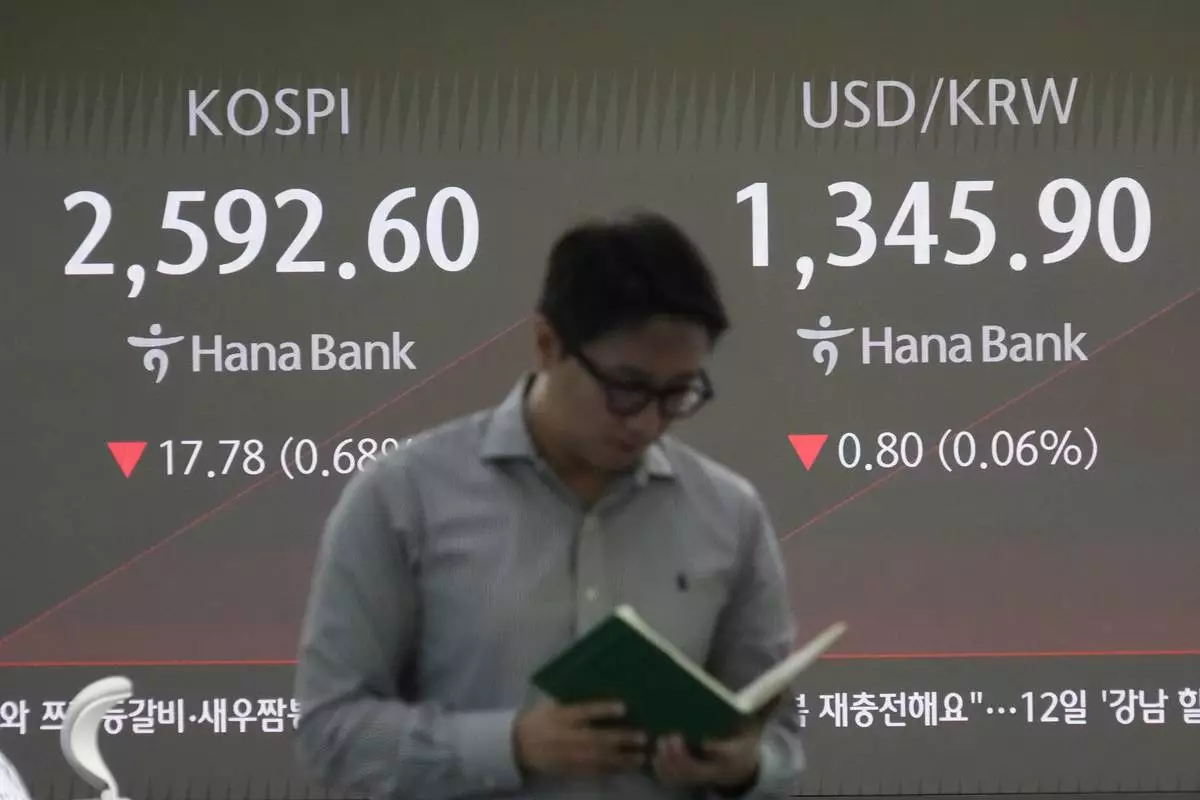
A currency trader passes by a screen showing the Korea Composite Stock Price Index (KOSPI), left, and the foreign exchange rate between U.S. dollar and South Korean won at the foreign exchange dealing room of the KEB Hana Bank headquarters in Seoul, South Korea, Tuesday, Oct. 8, 2024. (AP Photo/Ahn Young-joon)
WASHINGTON (AP) — Hours clicking toward a midnight government shutdown deadline, the Senate was preparing to give final passage late Friday to a new plan that would temporarily fund federal operations and disaster aid, but drops President-elect Donald Trump's demands for a debt limit increase into the new year.
House Speaker Mike Johnson had insisted Congress would “meet our obligations” and not allow federal operations to shutter ahead of the Christmas holiday season. But the day's outcome was uncertain after Trump doubled down on his insistence that a debt ceiling increase be included in any deal — if not, he said in an early morning post, let the closures “start now.”
The House approved Johnson's new bill overwhelmingly, 366-34, and the Senate was working late into the night toward votes.
“This is a good outcome for the country, ” Johnson said afterward, adding he had spoken with Trump and the president-elect “was certainly happy about this outcome, as well.”
It was the third attempt from Johnson, the beleaguered House speaker, to achieve one of the basic requirements of the federal government — keeping it open. And it raised stark questions about whether Johnson will be able to keep his job, in the face of angry GOP colleagues, and work alongside Trump and billionaire ally Elon Musk, who called the legislative plays, from afar.
President Joe Biden, who has played a less public role in the process throughout a turbulent week, was expected to quickly sign the measure into law.
Trump's last-minute demand was almost an impossible ask, and Johnson had almost no choice but to work around his pressure for a debt ceiling increase. The speaker knew there wouldn’t be enough support within the GOP majority to pass any funding package, since many Republican deficit hawks prefer to slash federal government and certainly wouldn’t allow more debt.
Instead, the Republicans, who will have full control of the White House, House and Senate next year, with big plans for tax cuts and other priorities, are showing they must routinely rely on Democrats for the votes needed to keep up with the routine operations of governing.
“So is this a Republican bill or a Democrat bill?” scoffed Musk on social media ahead of the vote.
The drastically slimmed-down 118-page package would fund the government at current levels through March 14 and add $100 billion in disaster aid and $10 billion in agricultural assistance to farmers.
Gone is Trump’s demand to lift the debt ceiling, which GOP leaders told lawmakers would be debated as part of their tax and border packages in the new year. Republicans made a so-called handshake agreement to raise the debt limit at that time while also cutting $2.5 trillion in spending over 10 years.
It’s essentially the same deal that flopped the night before in a spectacular setback — opposed by most Democrats and some of the most conservative Republicans — minus Trump’s debt ceiling demand.
But it's far smaller than the original bipartisan accord Johnson struck with Democratic and Republican leaders — a 1,500-page bill that Trump and Musk rejected, forcing him to start over. It was stuffed with a long list of other bills — including much-derided pay raises for lawmakers — but also other measures with broad bipartisan support that now have a tougher path to becoming law.
House Democrats were cool to the latest effort after Johnson reneged on the hard-fought bipartisan compromise.
Rep. Rosa DeLauro, the top Democrat on the Appropriations Committee, said it looked like Musk, the wealthiest man in the world, was calling the shots for Trump and Republicans.
“Who is in charge?” she asked during the debate.
Still, the Democrats put up more votes than Republicans for the bill's passage. Almost three dozen conservative Republicans voted against it.
“The House Democrats have successfully stopped extreme MAGA Republicans from shutting down the government, crashing the economy and hurting working class Americans all across the nation,” House Democratic Leader Hakeem Jeffries said after the vote.
Trump, who has not yet been sworn into office, is showing the power but also the limits of his sway with Congress, as he intervenes and orchestrates affairs from Mar-a-Lago alongside Musk, who is heading up the incoming administration's new Department of Government Efficiency.
The incoming Trump administration vows to slash the federal budget and fire thousands of employees and is counting on Republicans for a big tax package. And Trump's not fearful of shutdowns the way lawmakers are, having sparked the longest government shutdown in history in his first term at the White House.
“If there is going to be a shutdown of government, let it begin now,” Trump posted early in the morning on social media.
More important for the president-elect was his demand for pushing the thorny debt ceiling debate off the table before he returns to the White House. The federal debt limit expires Jan. 1, and Trump doesn't want the first months of his new administration saddled with tough negotiations in Congress to lift the nation's borrowing capacity. Now Johnson will be on the hook to deliver.
“Congress must get rid of, or extend out to, perhaps, 2029, the ridiculous Debt Ceiling,” Trump posted — increasing his demand for a new five-year debt limit increase. "Without this, we should never make a deal."
Government workers had already been told to prepare for a federal shutdown which would send millions of employees — and members of the military — into the holiday season without paychecks.
Biden has been in discussions with Jeffries and Senate Majority Leader Chuck Schumer, but White House press secretary Karine Jean-Pierre said, “Republicans blew up this deal. They did, and they need to fix this.”
As the day dragged on with no deal in sight, Senate Republican Leader Mitch McConnell stepped in to remind colleagues “how harmful it is to shut the government down, and how foolish it is to bet your own side won’t take the blame for it.”
At one point, Johnson asked House Republicans for a lunchtime meeting for a show of hands as they tried to choose the path forward.
It wasn't just the shutdown, but the speaker's job on the line. The speaker's election is the first vote of the new Congress, which convenes Jan. 3, and some Trump allies have floated Musk for speaker.
Johnson said he spoke to Musk ahead of the vote Friday and they talked about the “extraordinary challenges of this job.”
Associated Press writers Kevin Freking, Stephen Groves, Mary Clare Jalonick, Darlene Superville and Bill Barrow contributed to this report.

Speaker of the House Mike Johnson, R-La., talks to reporters after passing the funding bill to avert the government shutdown at the Capitol in Washington, Friday, Dec. 20, 2024. (AP Photo/Jose Luis Magana)

Speaker of the House Mike Johnson, R-La., talks to reporters after passing the funding bill to avert the government shutdown at the Capitol in Washington, Friday, Dec. 20, 2024. (AP Photo/Jose Luis Magana)
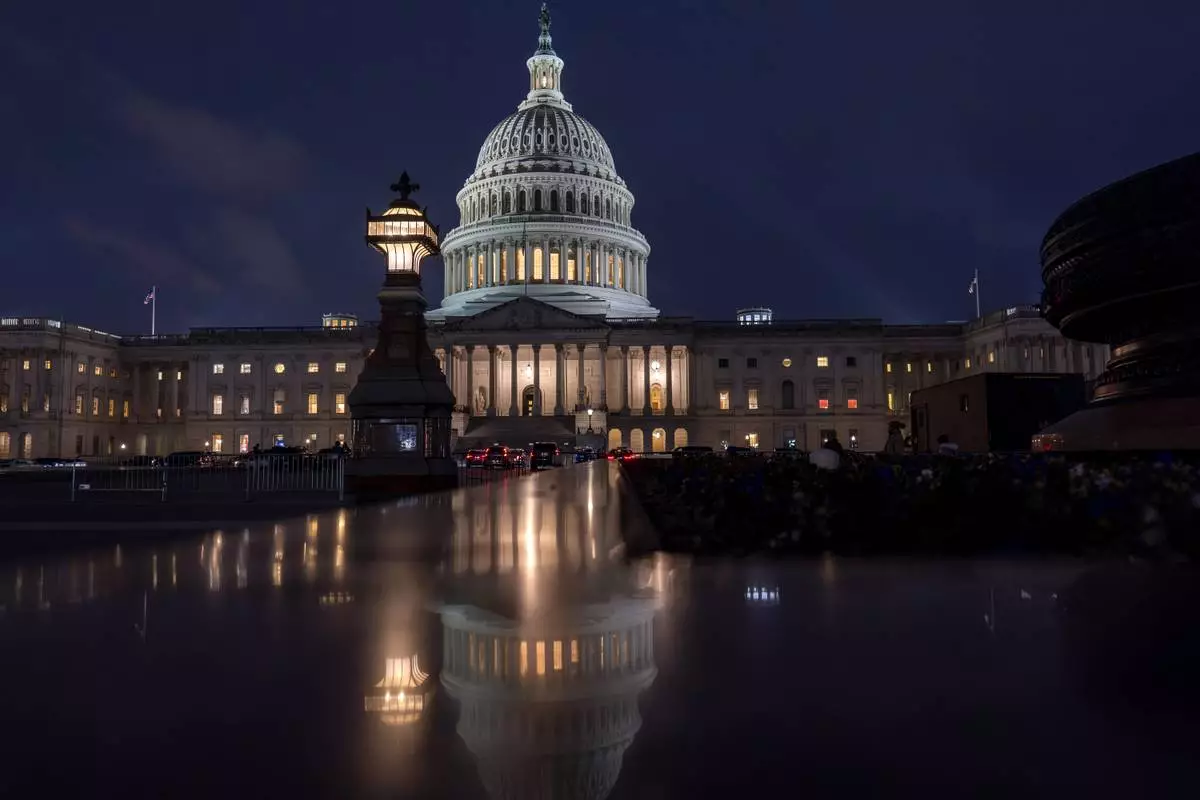
The Capitol is pictured in Washington, Friday, Dec. 20, 2024. (AP Photo/J. Scott Applewhite)
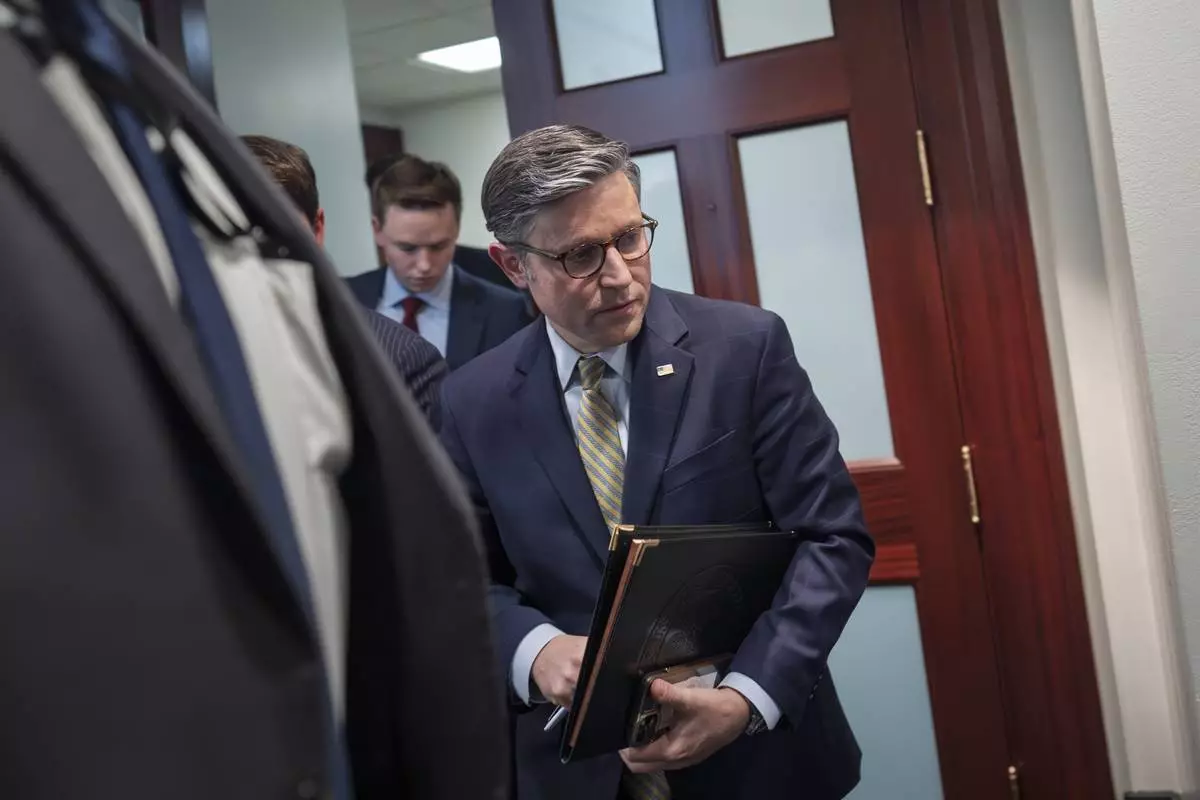
Speaker of the House Mike Johnson, R-La., emerges from a closed-door meeting with fellow Republicans at the Capitol in Washington, Friday, Dec. 20, 2024. (AP Photo/J. Scott Applewhite)
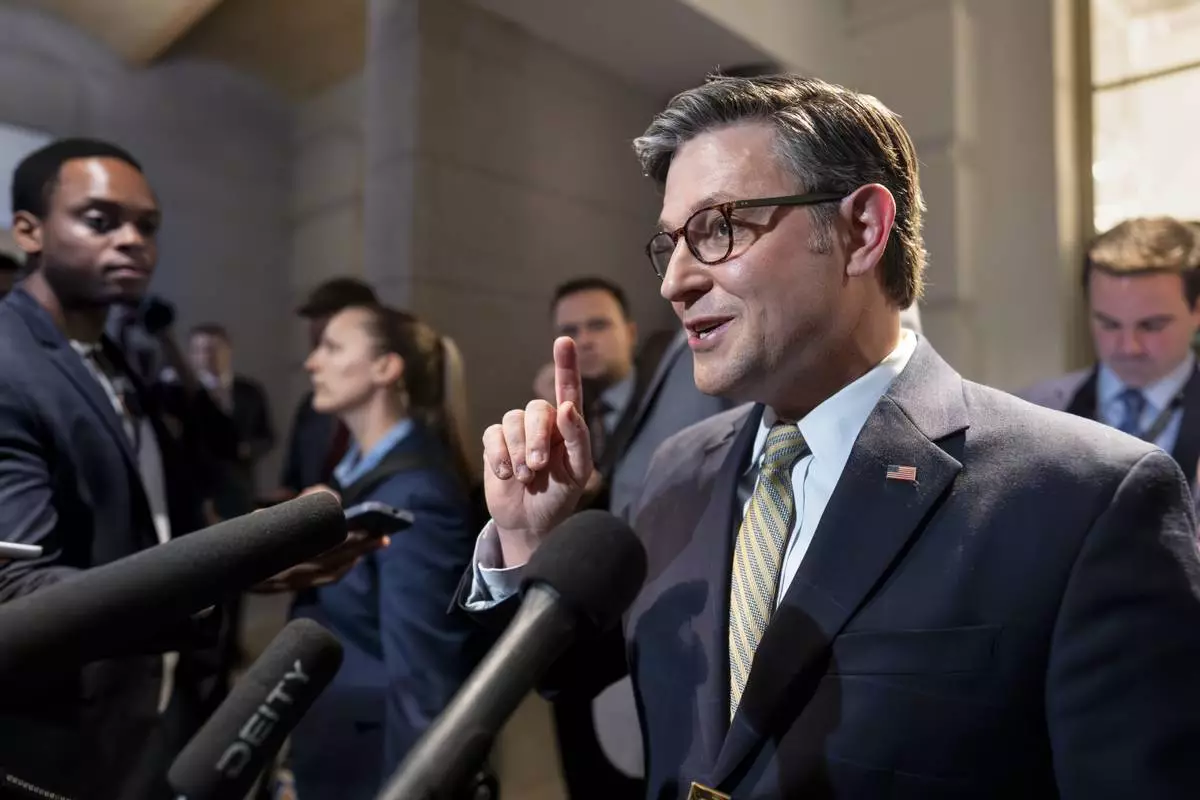
Speaker of the House Mike Johnson, R-La., emerges from a closed-door meeting with fellow Republicans at the Capitol in Washington, Friday, Dec. 20, 2024. (AP Photo/J. Scott Applewhite)
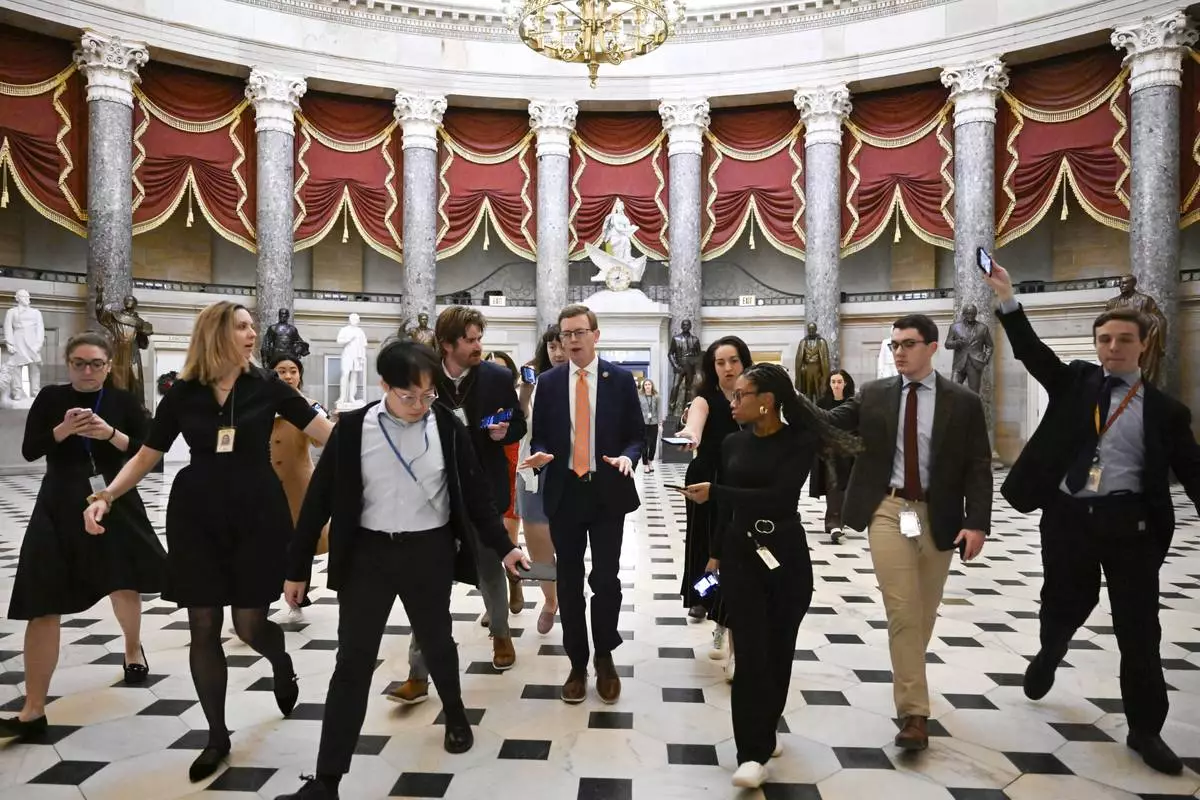
Rep. Dusty Johnson, R-S.D., talks with reporters after attending a meeting with Speaker of the House Mike Johnson, R-La., as the House works on a spending bill to avert a shutdown of the Federal Government, Friday, Dec. 20, 2024, at the Capitol in Washington. (AP Photo/John McDonnell)

FILE - President-elect Donald Trump poses for a photo with Dana White, Kid Rock and Elon Musk at UFC 309 at Madison Square Garden, Nov. 16, 2024, in New York. (AP Photo/Evan Vucci, File)
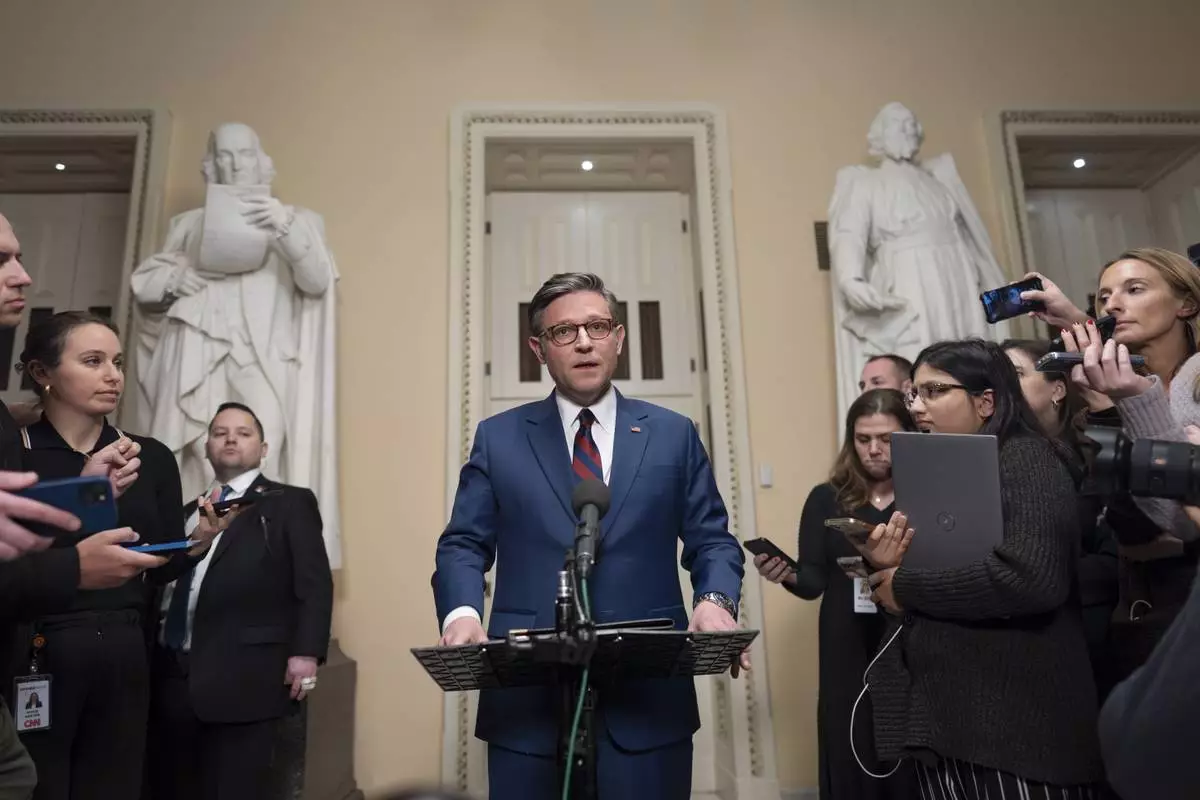
Speaker of the House Mike Johnson, R-La., talks briefly to reporters just before a vote on an interim spending bill to prevent a government shutdown, at the Capitol in Washington, Thursday, Dec. 19, 2024. The vote failed to pass. (AP Photo/J. Scott Applewhite)
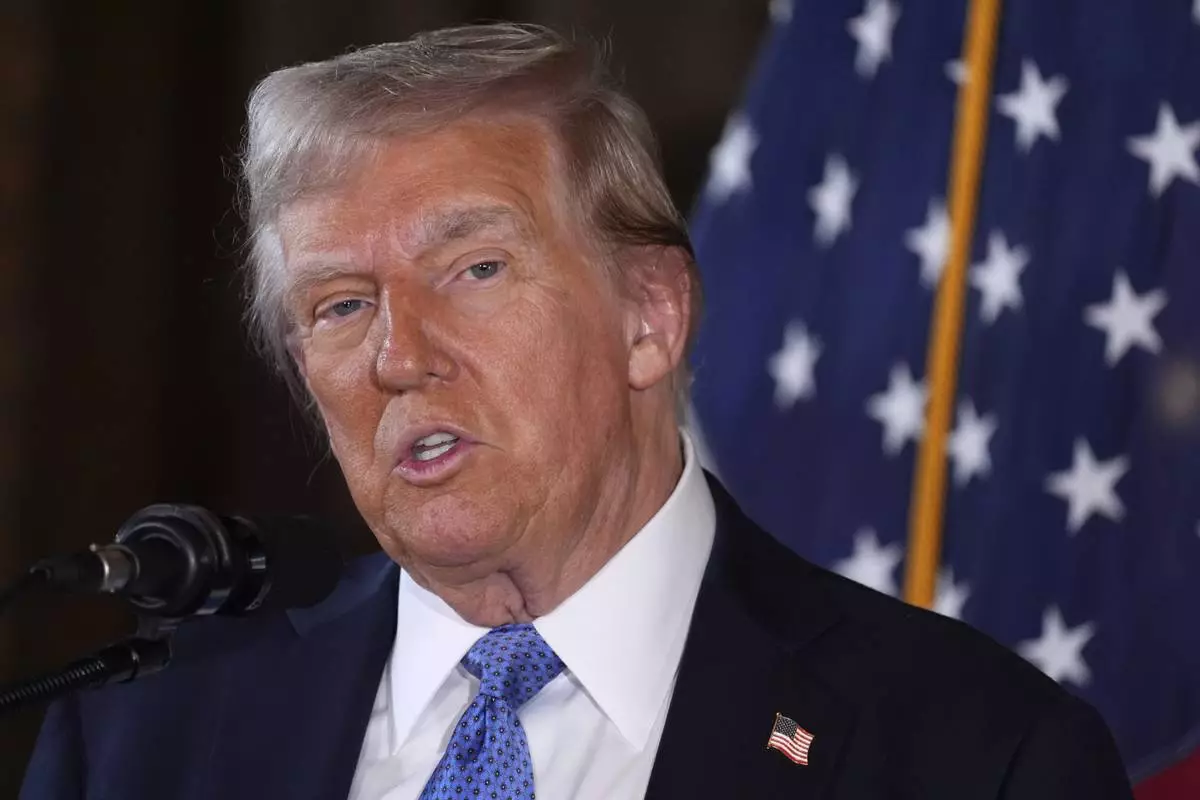
President-elect Donald Trump speaks during a news conference at Mar-a-Lago, Monday, Dec. 16, 2024, in Palm Beach, Fla. (AP Photo/Evan Vucci)
























